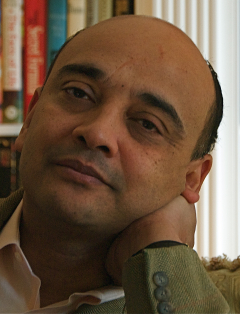
Kwame Anthony Appiah
Professor of Philosophy and Law, New York University
Howison Lectures in Philosophy
February 6, 2015 — 4:10 PMChevron Auditorium, International House — UC Berkeley Campus
About the Lecture Dr. Appiah will begin with an account of the ideas of the philosopher Hans Vahinger, who argued a century ago that almost all of our theories of the world–in every domain–involved understanding things “as if” what is … Continued
Chevron Auditorium, International House - UC Berkeley Campus Berkeley Graduate Lectures [email protected] false MM/DD/YYYYAbout the Lecture
Dr. Appiah will begin with an account of the ideas of the philosopher Hans Vahinger, who argued a century ago that almost all of our theories of the world–in every domain–involved understanding things “as if” what is in fact false were true. The nineteenth-century theory of gases treated them, for example, as if they were made up of tiny inelastic spheres … which they are not; in political philosophy we grant people certain rights as if they were responsible, rational agents … which we are not. Dr. Appiah shall then use Vahinger’s ideas to discuss a contemporary philosophical proposal, due to Dan Dennett, that says that human beings can be understood by way of an “intentional strategy” that “consists of treating the object whose behavior you want to predict as a rational agent with beliefs and desires and other mental states …” Since, as Dr. Appiah suggests, we are not fully rational, there is a puzzle about why this should work. He wants to say something about this puzzle, though he doesn’t aim to solve it.
About Kwame Anthony Appiah
A leading moral and political philosopher, Professor Appiah has also published widely on the topics of African and African-American literary and cultural studies. He is Professor of Philosophy and Law at New York University and lectures frequently throughout the world. In 2012, he was awarded a National Humanities Medal by President Obama, and in 2010, was named one of the top 100 global thinkers by Foreign Policy Magazine. His current work, which he will discuss in his lecture, was the subject of his 2013 Carus lectures for the American Philosophical Association, and focuses on the roles of idealization and ideals in psychology, ethics and politics. Appiah is also working on a new book about the idea of the West, in which he argues that appeals to Western traditions and identities are usually wildly misleading.
Professor Appiah is a prolific writer, whose publications, both academic and popular, span a variety of disciplines. His most recent book, Lines of Descent (2014), is an intellectual biography of W.E.B. Du Bois. The Honor Code: How Moral Revolutions Happen was named one of the 100 notable books of 2010; it was also a Times Literary Supplement Book of the Year. Experiments in Ethics, based on the 2005 Flexner Lectures at Bryn Mawr, was published by Harvard University Press in 2008, and endeavors to relate philosophical ethics to the new empirical moral psychology. Other major works include Cosmopolitanism: Ethics in a World of Strangers, published in 2006 and praised by Kofi Annan as “a welcome prescription for a world still plagued by fanaticism”; The Ethics of Identity (2005); and Thinking It Through (2004), an introduction to contemporary philosophy published by Oxford University Press. Appiah is co-editor, with Henry Louis Gates, Jr., of the Africana Encyclopedia and of the Dictionary of Global Culture.